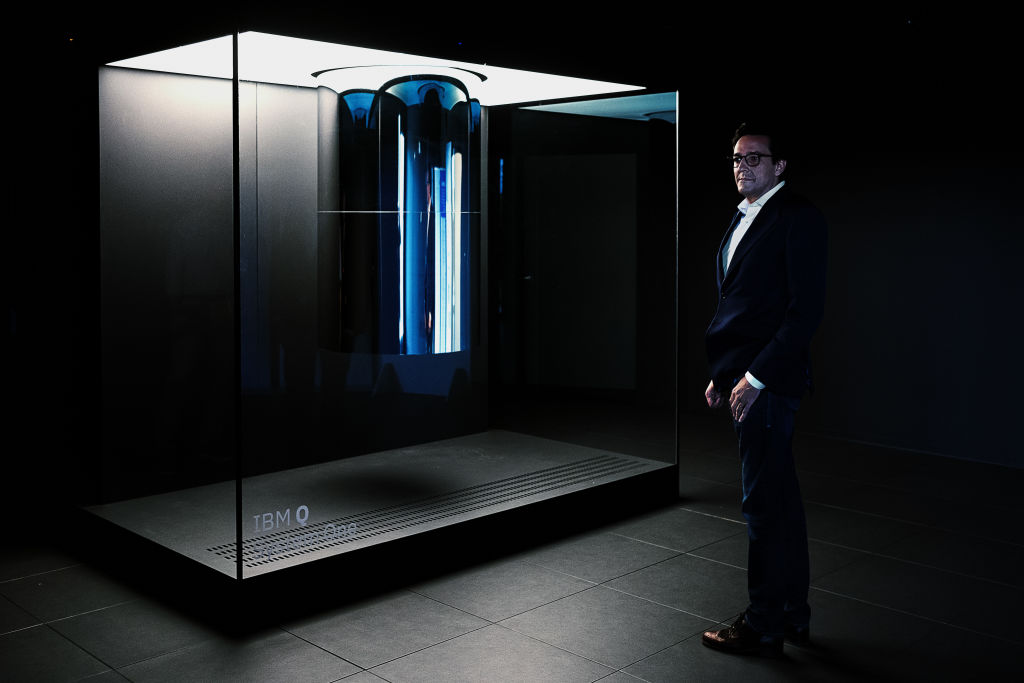谷歌工程师建造了一台量子计算机,它能在200秒内完成一项计算,这将花费一台传统计算机10,000年的时间,这一壮举只能说是令人印象深刻。但是他们声称已经达到了一个重要的里程碑——量子计算机可以超越传统计算机的时候,他们受到了一些挫折。
2012年,约翰·普雷斯基尔量杂志称这个里程碑为“量子至上”谷歌人借用了他在通常严肃的《自然》杂志论文标题中的短语——“使用可编程超导处理器的量子优势”。
竞争对手国际商用机器公司的一些工程师对这一描述提出异议。在一篇博客文章中,他们认为自然论文没有描述与任何现实世界应用相关的实验——因此量子至上的里程碑仍然难以捉摸。
让我们希望中型散货箱是对的。量子计算机利用亚原子物理学的奇异性来完成难以置信的计算壮举的潜力,将对我们依赖互联网的数据密集型世界构成威胁。

2019年10月18日,美国国际商用机器公司研究部主任达里奥·吉尔(Dario Gil)站在该公司位于纽约约克敦高地的研究机构的IBM Q System One前,对于美国国家安全而言,噩梦是中国开发出了一台工作正常的量子计算机,而没有伸出手来。
大多数专家预计量子计算不会在10年或更长时间内为黄金时段做好准备。但那只是猜测。真正的量子优势将使最常见的加密形式过时。没有人真正知道什么时候清算的时刻会到来,什么时候量子计算机能够破解任何代码来揭示国家的秘密,或者谁将首先完成它。随着各国争夺量子优势,这种影响正在助长一种竞赛。
从美国国家安全的角度来看,噩梦般的场景是,中国开发了一台工作正常的量子计算机,却没有伸出手来。这将使中国能够自由解密安全通信,并获得大量美国情报数据。“中国可以比预期更早地秘密发展量子计算,并将其应用于敏感通信领域,以挫败或战略性地包围美国。”艾尔莎·卡尼亚和约翰·科斯特洛写道在新美国安全中心的一份报告中。“这样一个巨大惊喜的到来将难以评估和判断,并可能混淆美国的情报评估。”
很难夸大量子计算所代表的潜在破坏。20世纪70年代开发的当前加密方法依靠数学复杂性来阻止黑客。数据是加密的,可以用被称为“密钥”的大数字解锁,只有发送方和接收方拥有密钥。如果没有钥匙,破解代码将需要很大的计算量,即使有世界上最好的电脑也需要很长时间。
然而,量子计算机会使当前的加密措施过时。量子计算机不是操纵比特,而是利用亚原子粒子的特殊性质,一次以一种以上的“状态”存在。物理学家埃德温·薛定谔把这种“状态叠加”比作一只猫同时死去和活着,这是出了名的。一个光粒子(称为光子)可以同时代表0、1和其他值。量子计算机可以操纵这些粒子同时进行许多计算,大大提高了它解决复杂问题的速度,例如破解加密。
中国已经让量子计算成为战略的命令。尽管中国过去被指控窃取技术,但其量子计算努力是本土的,而且是实质性的。据报道,它在安徽省的新研究实验室上花费了4亿美元。中国不是唯一一个发展量子技术的国家——美国、欧洲和日本也有正在进行的项目。美国国家安全局耗资8000万美元建造一台名为“穿透硬目标”的量子计算机的项目是在爱德华·斯诺登泄露的文件中透露。
为了防止量子黑客攻击,各国正在开发一种量子加密的形式,这种形式可以加强通信,防止量子黑客攻击。量子通信网络将使用光子等粒子,而不是使用数字密钥来加密数据。在2017年的一项实验中,中国米修斯卫星发射升空光子到达相距1200公里的两个不同地面站。一个地面站的光子与另一个地面站的光子“纠缠”。纠缠是量子物理学的另一个奇怪现象,两个粒子以某种方式联系在一起——爱因斯坦称之为“远距离的怪异行为”纠缠粒子可以作为加密传输的不可破解的密钥。
米修斯是第一个计划中的卫星星座,将作为中国量子通信网络的主干。中国还在北京和上海之间修建了一条2000公里长的量子干线,并计划将该网络扩展到全国。
为了防止量子意外,标准组织已经在计划新的加密协议,让数据不那么容易受到量子计算机的攻击。转向不依赖大数字密钥的新加密方案需要对数据通信进行大规模重组。
美国政策制定者还担心中国在量子计算领域的成就和它在5G通信领域的成就一样:让美国工业措手不及。他们说,华盛顿需要的是某种产业政策。“我们有非常强大的科技公司,”美国国务院前网络安全高级外交官克里斯托弗·佩因特说。“但如果我们真的想保持优势,我们需要在战略层面认真对待这一点。”
ARE WE READY FOR A 'QUANTUM SURPRISE' FROM CHINA?
Google engineers built a quantum computer that can perform a calculation in 200 seconds that would take a conventional computer 10,000 years, a feat that can only be described as impressive. But they got some blowback for their claim to have reached a crucial milestone—the point at which quantum computers can outperform conventional ones.
In 2012, John Preskill in Quanta magazine dubbed this milestone "quantum supremacy." The Googlers borrowed his phrase in the title of their paper—"Quantum supremacy using a programmable superconducting processor"—in the normally staid journal Nature.
Some engineers from rival IBM Corp. took issue with this characterization. In a blog post, they argued that the Nature paper did not describe an experiment that has relevance to any real-world application—and therefore that the quantum-supremacy milestone remains elusive.
Let's hope the IBMers are right. The potential of quantum computers to leverage the weirdness of subatomic physics to perform incredible feats of computation would pose a threat to our data-heavy internet-dependent world.

Dario Gil, Director of IBM Research, standing in front of IBM Q System One on October 18, 2019 at the company's research facility in Yorktown Heights, N.Y. For U.S. national security, the nightmare is that China develops a working quantum computer without tipping its hand.
Most experts don't expect the quantum computing to be ready for prime time for 10 years or more. But that's just a guess. True quantum supremacy would render the most common form of encryption obsolete. Nobody really knows when the moment of reckoning will come when quantum computers will be capable of cracking any code to reveal the secrets of nations, or who will accomplish it first. The implications are fueling a race of sorts, as nations vie for a quantum edge.
The nightmare scenario, from the standpoint of U.S. national security, is that China develops a working quantum computer without tipping its hand. That would leave China free to decrypt secure communications and gain access to reams of U.S. intelligence data. "China could develop quantum computing in secret, earlier than anticipated, and employ it against sensitive communications to out maneuver or strategically outflank the U.S.," wrote Elsa Kania and John Costello in a report for the Center for a New American Security. "The arrival of such a quantum surprise would be difficult to assess and judge, and could confound U.S. intelligence assessments."
It's hard to overstate the potential for disruption that quantum computing represents. Current methods of encryption, developed in the 1970s, rely on mathematical complexity to deter hackers. Data is scrambled and can be unlocked with big numbers called "keys," which only senders and receivers possess. Without the key, cracking the code would take a calculation so large that it would take an eternity even with the world's best computers.
A quantum computer, however, would make current encryption measures obsolete. Rather than manipulating bits, quantum computers take advantage of a peculiar quality of subatomic particles to exist in more than one "state" at a time. The physicist Edwin Schrodinger famously likened this "superposition of states" to a cat being both dead and alive at the same time. A particle of light (called a photon) can be made to represent 0, 1 and other values all at once. A quantum computer can manipulate these particles to perform many calculations simultaneously, vastly increasing the speed at which it can solve complex problems, such as cracking encryption.
China has made quantum computing a strategic imperative. Although China has been accused of stealing technology in the past, its quantum computing effort is home-grown and substantial. It reportedly spent $400 million on new research labs in Anhui province. China is not the only country developing quantum technology--the U.S., Europe and Japan also have projects in the works. An $80 million NSA project to build a quantum computer, called Penetrating Hard Targets, was revealed among the documents leaked by Edward Snowden.
To protect against quantum hacking, nations are developing a form of quantum encryption that would harden communications against quantum hacking. Rather than using numerical keys to encrypt data, a quantum communications network would employ particles such as photons. In a 2017 experiment, China's Micius satellite beamed photons to two different ground stations 1200 kilometers apart. The photons at one ground station were "entangled" with the photons at the other ground station. Entanglement is another oddity of quantum physics whereby two particles are somehow linked—Einstein called it "spooky action at a distance." Entangled particles could serve as unhackable keys to encrypted transmissions.
Micius is the first of a planned constellation of satellites that would serve as the backbone of a Chinese quantum communications network. China has also built a 2000-kilometer quantum trunk line between Beijing and Shanghai and has plans to extend the network nationwide.
To forestall a quantum surprise, standards organizations are already planning for new encryption protocols that would leave data less vulnerable to quantum computers. Moving to a new encryption scheme that didn't rely on large numeric keys would require a vast retooling of data communications.
U.S. policymakers also worry that China accomplish in quantum computing what it did in 5G communications: catch the U.S. industry flat-footed. What's needed, they say, is some kind of industrial policy in Washington. "We have really strong tech companies," says Christopher Painter, former top diplomat on cybersecurity at the U.S. State Department. "But if we really want to maintain an edge, we need to take this seriously at a strategic level."






